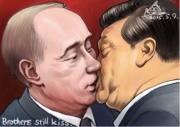(Thread IKs:
dead gay comedy forums)
|
Moon Shrimp posted:Ok I see now, you guys are talking about there being fewer opportunities to reinvest profits. It's a little more complicated than just that though. If they had a free hand then without opportunities to make even more money they would just spend the excess on building more ridiculous houses and paedo billionaire islands. The source of crisis is that structurally they can't do that - the nature of capitalist economy means they have to try and use this mass of cash and find more and more ways to get more value for it. It's the massive deployment of spending on capital which makes that harder and harder and so builds to crisis.
|
|
|
|

|
| # ? May 23, 2024 12:50 |
|
namesake posted:It's a little more complicated than just that though. If they had a free hand then without opportunities to make even more money they would just spend the excess on building more ridiculous houses and paedo billionaire islands. The source of crisis is that structurally they can't do that - the nature of capitalist economy means they have to try and use this mass of cash and find more and more ways to get more value for it. It's the massive deployment of spending on capital which makes that harder and harder and so builds to crisis. The main reason neoliberalism is so popular today is due to the fact that cutting taxes & government expenditures is one of the main ways to return profitability to capital markets. Most of those gains have been coming out of the commons and even the boosts from tax cuts have been drying up in the last few years. Before covid.
|
|
|
|
oh my god the anti-tankie subreddit https://www.reddit.com/r/tankiejerk
|
|
|
|
the anti-tankie thread on sa is obliged to answer me if they are a stanford experimenter it's in the rules you have to say yes if you are
|
|
|
|
we are not presently disposed towards discussing such operations, even if such operations were indeed to exist
|
|
|
|
comedyblissoption posted:the anti-tankie thread on sa is obliged to answer me if they are a stanford experimenter it's in the rules you have to say yes if you are really getting the impression that this thread's culture and/or posting standards might be better suited to professor milgram's experiment
|
|
|
|
https://www.instagram.com/p/CP138qiD-2H/?utm_source=ig_web_copy_link come to our rally tomorrow at 7 pm eastern to learn about the projects I lead within @blackhammerorg2.0 international SciTech committee, including inventing free water filters 💧 for colonized people being killed by poisoned water and constructing underground greenhouses 🌱 to feed our people in Hammer City. dm me for zoom link!
|
|
|
|
underground greenhouses
|
|
|
|
taliban mountain base cutaway diagram but with black hammer
|
|
|
|
kkkolonizer
|
|
|
|
namesake posted:It's a little more complicated than just that though. If they had a free hand then without opportunities to make even more money they would just spend the excess on building more ridiculous houses and paedo billionaire islands. The source of crisis is that structurally they can't do that - the nature of capitalist economy means they have to try and use this mass of cash and find more and more ways to get more value for it. It's the massive deployment of spending on capital which makes that harder and harder and so builds to crisis. imho, the best way atm to demonstrate that is the incredible amount of money that major companies dedicate to stock buybacks, in order to maintain stock prices or to increase value according to expectations should that not happen, the stocks will not appreciate in value, which to other investors would mean "uh oh they are becoming less profitable", even if the company is perfectly fine in cash reserves and revenue, leading to disbursement of that company
|
|
|
|
indigi posted:underground greenhouses That sounds like one of those things that you'd see on a conspiracy theory meme with the iceberg and different levels of derangement It'd be one of the deeper tiers for sure
|
|
|
|
Mr. Lobe posted:That sounds like one of those things that you'd see on a conspiracy theory meme with the iceberg and different levels of derangement It would not be difficult mein Fuhrer! Nuclear reactors could, heh... I'm sorry. Mr. President. Nuclear reactors could provide power almost indefinitely. Greenhouses could maintain plantlife. Animals could be bred and slaughtered. A quick survey would have to be made of all the available mine sites in the country. But I would guess... that ah, dwelling space for several hundred thousands of our people could easily be provided.
|
|
|
|
lenin 3 stroke: https://www.youtube.com/watch?v=_wEpofHt6f8 Homeless Friend has issued a correction as of 18:00 on Jun 11, 2021 |
|
|
|
dead gay comedy forums posted:imho, the best way atm to demonstrate that is the incredible amount of money that major companies dedicate to stock buybacks, in order to maintain stock prices or to increase value according to expectations
|
|
|
|
stock buybacks can have multiple purposes that serve the interests of the capitalist class
|
|
|
|
indigi posted:underground greenhouses These are actually a thing! You can find info under the name walipini. It keeps the tempature inside fairly consistent throughout the year. It's only like 6' under, so you can still get pretty good sun if you're strategic about where you build it. All you need is a lot of physical labor, some plastic to keep the walls from collapsing, and some urethane sheets to function as a roof and air gap. No idea if they mean that or some harebrained scheme and I do not care enough to find out
|
|
|
|
Underground greenhouses are growing weed in abandoned bomb shelters and nuclear missile silos. And good luck to them.
|
|
|
|
Moon Shrimp posted:Ok I see now, you guys are talking about there being fewer opportunities to reinvest profits. ya basically it's that the mass of profit (the ratio of production cost to market price) of your detergent isn't the rate of profit of the industry. the mass of profit as be quite high even while the rate of profit is totally stagnant. in fact, i think the mass of profit is so high likely because the rate of profit is so low.
|
|
|
|
splifyphus posted:ya basically it's that the mass of profit (the ratio of production cost to market price) of your detergent isn't the rate of profit of the industry. the mass of profit as be quite high even while the rate of profit is totally stagnant. in fact, i think the mass of profit is so high likely because the rate of profit is so low. is this a breakdown in the M-C phase or the C-M phase, or is that the wrong way to think about it? itís cool to think of capital as a stagnant, accumulating mass and profit as energetic capital in motion
|
|
|
|
Centrist Committee posted:is this a breakdown in the M-C phase or the C-M phase, or is that the wrong way to think about it? I'd say it's a failure of the C-M' stage but because the system knows that that part isn't working it doesn't even initiate the M-C part of the circulation. There's always the possibility of buying more C - always workers with some spare time somewhere and machinery can always be ordered - but throwing more labour into their operations would lower productivity overall and there doesn't seem to be any opportunity to expand their markets which would make a large amount of capital investment worthwhile any more. It's a good point about thinking of already existing capital as the stagnant lump though, really demonstrates the 'dead labour' part of capitalism.
|
|
|
|
yeah the necromantic analogies of capital really suit best when thinking about these incredible masses of value that do... nothing something that isn't obvious - at least in my opinion - is that capital's value (not the value of capital) can only be realized in its execution, otherwise that amount of money might as well not exist at all, which is where fictitious capital starts to come up. Taking money out from derivative stocks into cryptocurrency titles is, in material economic terms, a non-existant operation: it is value that never gets to be realized as such because it never becomes even remotely close to money so, as this blob of "value" increases in expectation of further profits, it starts to drain actual value from other means, from speculators to small investors simply looking for something with greater returns (but who were investing in solid stuff), and that blob starts devouring realized value as a result what I am getting at is that excessive speculative and fictitious capital when pumped non-stop becomes Aldritch from dark souls 3 okay
|
|
|
|
Centrist Committee posted:is this a breakdown in the M-C phase or the C-M phase, or is that the wrong way to think about it? hrmmm ya kind of. so the rate of profit is the ratio of the total surplus value to the capital invested at the macro level. what moon shrimp is observing is the ratio of the cost of production to final market price. they're related but fundamentally different measurements taken at different moments of the whole cycle. the former determines the latter, not the other way around. i think, at least. it's been a while. e: so you can't extrapolate the RoP from your daily purchases, and it's perfectly possible to have a very low rate of profit that nonetheless generates a big ol mass of profit in absolute terms. emTme3 has issued a correction as of 00:11 on Jun 12, 2021 |
|
|
|
it is also interesting to note that despite the extraordinary amounts of money introduced into the global economy since 2008, inflation* has been very moderate. this makes a lot of sense if you consider inflation a measure of realised value and note that a great deal of the increased money supply is never actually going to be realised, but exists to prop up the balance sheets of strategically important actors in the political economy *yes yes i know
|
|
|
|
Samir Amin's Eurocentrism 👀😤🙏👑
|
|
|
|
V. Illych L. posted:it is also interesting to note that despite the extraordinary amounts of money introduced into the global economy since 2008, inflation* has been very moderate. this makes a lot of sense if you consider inflation a measure of realised value and note that a great deal of the increased money supply is never actually going to be realised, but exists to prop up the balance sheets of strategically important actors in the political economy I used to think that too, but the spigot won't turn off once those balance sheets are secured. So one of the places all that extra money will go into is commodity markets.
|
|
|
|
Pener Kropoopkin posted:I used to think that too, but the spigot won't turn off once those balance sheets are secured. So one of the places all that extra money will go into is commodity markets. lol until i read this i though the first world would never see a revolution, but that's like a textbook "thing that triggers unexpected revolution" right there not until we've all suffered and the most vulnerable among us die though
|
|
|
|
|
|
|
|

|
|
|
|
is that from the stanford subreddit experiment?
|
|
|
|
Pener Kropoopkin posted:I used to think that too, but the spigot won't turn off once those balance sheets are secured. So one of the places all that extra money will go into is commodity markets. this is a reasonable point, but imo it's a point for the new reality, not the reality of 2008-2020 where you didn't really see the especially unheard of stuff going on rn
|
|
|
|
yr new gurlfrand! posted:is that from the stanford subreddit experiment? he got banned even from there for posting a thread lamenting Castillo's win in Peru https://www.reddit.com/r/tankiejerk/comments/nuocb6/an_actual_tankie_is_about_to_win_in_my_country/ quote:I've banned OP and locked the comments, this post was posted to twitter. After looking through OP's comments I have found support for a ban, this includes them defending the CIA, self describing as a liberal, and called the removal of fascists authoritarian, alongside other reasons. I'm locking comments in order to stop people from twitter commenting
|
|
|
|
that face when you're half a page into losurdo's liberalism and the second example is the liberal position's defense of slavery as a positive good
|
|
|
|
I'll paste a big stupid block quote here, since it is related to the discussion of the laws of value, and also, because I like it  quote:
|
|
|
|
cool
|
|
|
|
Algund Eenboom posted:The difference between the two rates of profit is necessary. Without that difference, the exploitation of labor by capital would be transparent (as are forms of exploitation prior to capitalism) and capitalism would not be capitalism, defined precisely by the opacification of this reality. this bit of your quote reminds me of this article: https://taiyangyu.medium.com/addressing-common-criticisms-of-the-labor-theory-of-value-bdf49281fab which points out that statistical studies have revealed that there is, in fact, a dialectical relationship between the law of value on one hand and the transformation of values into prices + profit equalization on the other hand that combine to determine the rates of profit in various industries. neither is immediately apparent, both are in play Ferrinus has issued a correction as of 20:46 on Jun 12, 2021 |
|
|
|
rate of profit r lol
|
|
|
|
What if there was an app that took in your hourly wage and replaced all monetary values in your browser with hours of labor to purchase
|
|
|
|
tokin opposition posted:What if there was an app that took in your hourly wage and replaced all monetary values in your browser with hours of labor to purchase labor value coin to da moon baby
|
|
|
|

|
| # ? May 23, 2024 12:50 |
|
editing post and adding filler bc wrong thread engels: most underrated marxist or what???
|
|
|































